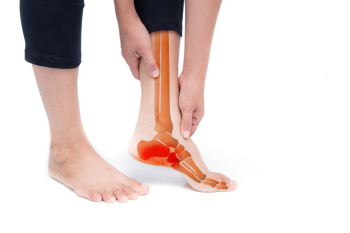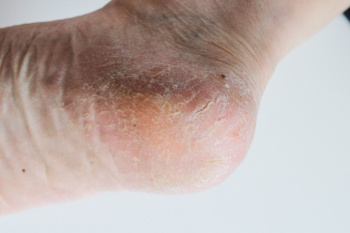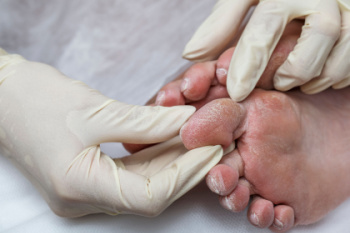

Peripheral neuropathy is a condition that damages the nerves, often in the feet and lower legs. It is common in people with diabetes but can also result from other health issues, such as vitamin deficiencies, chemotherapy, or excessive alcohol use. The damaged nerves can cause numbness, tingling, burning, or sharp pain. Some people lose feeling in their feet, making it hard to notice cuts, blisters, or injuries. Without proper care, these small issues can lead to infections or serious complications. People with peripheral neuropathy may also have trouble with balance and walking because they cannot feel the ground beneath their feet. Daily foot checks, supportive footwear, and regular visits to a podiatrist are important for preventing problems. If you notice unusual sensations or numbness in your feet, it is suggested that you see a podiatrist for a proper diagnosis and appropriate care.
Neuropathy
Neuropathy can be a potentially serious condition, especially if it is left undiagnosed. If you have any concerns that you may be experiencing nerve loss in your feet, consult with Dr. Edward D. Hutson from Easton, PA. . Our doctor will assess your condition and provide you with quality foot and ankle treatment for neuropathy.
What Is Neuropathy?
Neuropathy is a condition that leads to damage to the nerves in the body. Peripheral neuropathy, or neuropathy that affects your peripheral nervous system, usually occurs in the feet. Neuropathy can be triggered by a number of different causes. Such causes include diabetes, infections, cancers, disorders, and toxic substances.
Symptoms of Neuropathy Include:
Those with diabetes are at serious risk due to being unable to feel an ulcer on their feet. Diabetics usually also suffer from poor blood circulation. This can lead to the wound not healing, infections occurring, and the limb may have to be amputated.
Treatment
To treat neuropathy in the foot, podiatrists will first diagnose the cause of the neuropathy. Figuring out the underlying cause of the neuropathy will allow the podiatrist to prescribe the best treatment, whether it be caused by diabetes, toxic substance exposure, infection, etc. If the nerve has not died, then it’s possible that sensation may be able to return to the foot.
Pain medication may be issued for pain. Electrical nerve stimulation can be used to stimulate nerves. If the neuropathy is caused from pressure on the nerves, then surgery may be necessary.
If you have any questions, please feel free to contact our offices located in Easton, and Northampton, PA . We offer the newest diagnostic and treatment technologies for all your foot care needs.

Cracked heels and fissures can develop from prolonged dryness, excessive pressure, and underlying health conditions. When the skin on the heels loses moisture and elasticity, deep cracks may form, making walking painful and increasing the risk of infection. Standing for long periods, wearing unsupportive footwear, and exposure to harsh environments can worsen the condition. Certain medical conditions like diabetes, thyroid disorders, and poor circulation can slow healing and lead to complications. If the cracks become deep, bleed, or show signs of infection, such as redness, swelling, or drainage, medical attention is necessary. Seeking care from a podiatrist early can prevent further damage and promote healing for healthier, more comfortable feet. If you have developed cracked heels, it is suggested that you consult a podiatrist who can provide appropriate treatment, including debridement, prescription creams, and specialized footwear recommendations.
Cracked heels are unsightly and can cause further damage to your shoes and feet. If you have any concerns, contact Dr. Edward D. Hutson from Easton, PA. . Our doctor can provide the care you need to keep you pain-free and on your feet.
Cracked Heels
Cracked heels appear unappealing and can make it harder for you walk around in sandals. Aside from looking unpleasant, cracked heels can also tear stockings, socks, and wear out your shoes. There are several methods to help restore a cracked heel and prevent further damage.
How Do You Get Them?
Dry skin is the number one culprit in creating cracked heels. Many athletes, walkers, joggers, and even swimmers suffer from cracked heels. Age and skin oil production play a role to getting cracked heels as well.
Promote Healing
Over the counter medicines can help, especially for those that need instant relief or who suffer from chronic dry feet.
Wear Socks – Wearing socks with medicated creams helps lock in moisture.
Moisturizers – Applying both day and night will help alleviate dryness which causes cracking.
Pumice Stones – These exfoliate and remove dead skin, which allows for smoother moisturizer application and better absorption into the skin.
Change in Diet
Eating healthy with a well-balanced diet will give the skin a fresh and radiant look. Your body responds to the kinds of food you ingest. Omega-3 fatty acids and zinc supplements can also revitalize skin tissue.
Most importantly, seek professional help if unsure how to proceed in treating cracked heels. A podiatrist will help you with any questions or information needed.
If you have any questions, please feel free to contact our offices located in Easton, and Northampton, PA . We offer the newest diagnostic and treatment technologies for all your foot care needs.

Diabetic limb salvage focuses on preserving affected extremities by addressing diabetic wounds early and effectively. Diabetes significantly impacts foot health, often causing foot ulcers and infections due to poor blood circulation, nerve damage known as peripheral neuropathy, and peripheral vascular disease, a condition where arteries narrow or become blocked. About 15 percent of diabetic patients experience foot ulcers, which, if left untreated, can lead to severe infections of the skin or underlying bones, increasing the risk of limb loss. A podiatrist plays an essential role in diabetic limb salvage by diagnosing foot conditions, managing wound care, and performing procedures like debridement to remove infected tissue. Podiatrists also use angioplasty or stenting to improve circulation, offloading techniques to reduce pressure on wounds, and orthopedic shoe inserts to support and protect the feet. Early podiatric care significantly reduces the risk of surgery or loss of limb. If you are suffering from diabetic foot problems, it is suggested that you schedule an appointment with a podiatrist for an exam, diagnosis, and ongoing treatment.
Limb salvage can be an effective way in preventing the need for limb amputation. If you have diabetes, cancer, or any other condition that could lead to foot amputation if left unchecked, consult with Dr. Edward D. Hutson from Easton, PA. . Our doctor will assess your condition and provide you with quality foot and ankle treatment.
What Is Limb Salvage?
Limb salvage is the attempt of saving a limb, such as the foot from amputation. Podiatrists also try to make sure that there is enough function in the foot after the salvage that it is still usable. Diabetes is the number one cause of non-traumatic amputations in the United States. Those with diabetes experience poor blood circulation, which prevents proper healing of an ulcer. If the ulcer is left uncheck, it could become infected, which could result in the need for amputation.
However, there are other causes as well, such as cancer and traumatic injury. Links between higher mortality rates and amputation have been found. This translates into higher healthcare costs, and a reduced quality of life and mobility for amputees. Podiatrists have attempted to increase the prevalence of limb salvage in an attempt to solve these issues.
Diagnosis and Treatment
Limb salvage teams have grown in recent years that utilize a number of different treatments to save the infected limb. This includes podiatrists that specialize in wound care, rehabilitation, orthotics, and surgery. Through a combination of these methods, limb salvage has been found to be an effective treatment for infected limbs, and as an alternative to amputation. Podiatrists will first evaluate the potential for limb salvage and determine if the limb can be saved or must be amputated.
If you have any questions, please feel free to contact our offices located in Easton, and Northampton, PA . We offer the newest diagnostic and treatment technologies for all your foot care needs.

Ankle fractures in seniors are often caused by falls, missteps, or weakened bones from osteoporosis. These injuries can significantly impact mobility, independence, and overall confidence, making individuals feel older than they are. A fractured ankle restricts walking, standing, and daily activities, often leading to reliance on others for basic tasks. Even six months after the initial injury, stiffness, pain, and reduced strength can persist, limiting mobility and affecting quality of life. Delayed or improper treatment may result in chronic pain, arthritis, or long-term instability. Early intervention by a podiatrist is essential for proper diagnosis, treatment, and rehabilitation. This type of doctor can provide support through casting, bracing, and ongoing care to promote optimal healing and prevent complications. If you are a senior and have sustained an ankle fracture, try not to let it define your independence. It is suggested that you see a podiatrist early on for expert care and recovery support.
Broken ankles need immediate treatment. If you are seeking treatment, contact Dr. Edward D. Hutson from Easton, PA. . Our doctor can provide the care you need to keep you pain-free and on your feet.
Broken Ankles
A broken ankle is experienced when a person fractures their tibia or fibula in the lower leg and ankle area. Both of these bones are attached at the bottom of the leg and combine to form what we know to be our ankle.
When a physician is referring to a break of the ankle, he or she is usually referring to a break in the area where the tibia and fibula are joined to create our ankle joint. Ankles are more prone to fractures because the ankle is an area that suffers a lot of pressure and stress. There are some obvious signs when a person experiences a fractured ankle, and the following symptoms may be present.
Symptoms of a Fractured Ankle
If you suspect an ankle fracture, it is recommended to seek treatment as soon as possible. The sooner you have your podiatrist diagnose the fracture, the quicker you’ll be on the way towards recovery.
If you have any questions, please feel free to contact our offices located in Easton, and Northampton, PA . We offer the newest diagnostic and treatment technologies for all your foot care needs.